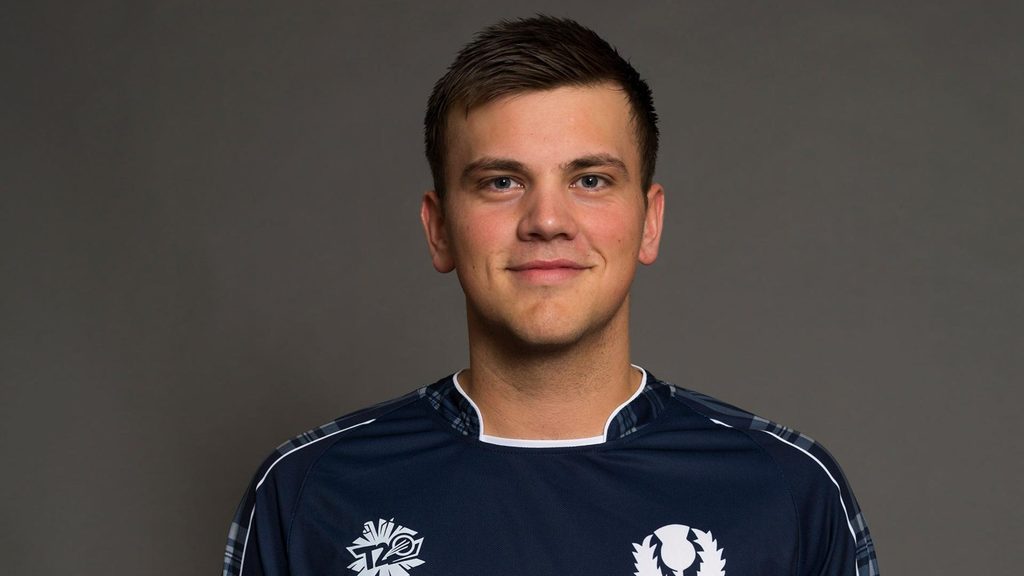Famous for his little hand-written notes on opposition players and impressive bowling performances at the T20 World Cup, Scotland’s star left-arm spinner Mark Wattis ready to shine on behalf of the Associates with the Desert Vipers at the inaugural ILT20.
In a candid chat with the Vipers Voices podcast Watt, who is one of only two Scotland bowlers to take over fifty T20I wickets, said he was most pleased about the ILT20’s decision to feature Associates and also Emirates players who often miss out on participating in major tournaments.“From the T20 World Cup gone by, everyone can see that Associates can play,” said Watt. “We are not there to just make up the numbers anymore, we are there to compete and take down these big nations.“I think it is a great idea (to have a quota of Associate and Affiliate players, plus Emirates players in squads, with a minimum of two Emirates players in each starting line-up), and I am really looking forward to representing one of the Associates and hopefully, show that we belong there.”Watt went on to explain the notes he carried with him during the T20 World Cup: “I have used it (the notes) since last year’s World Cup (in the UAE). We played against India, and I spoke to (Ravichandran)Ashwin after the game, and he told me how much time he spends on analysis and figuring out where to bowl to each player. So, it is something that I tried to learn from him.“I did not go to University or College, so I thought I should do a bit of studying in my life. So, before a game I have a look at the footage and see what fields need to be set, and because I have got a terrible memory and I can’t remember each and every thing for each batter, I tend to write them down, and the camera seemed to like that and so did the people (watching) back at home.”The good news is that following a successful past 18 months, playing in two T20 World Cups in the UAE and Australia, Mark Watt comes into the tournament confident of a good showing. Watt said: “I feel on top of my game, I just want to keep improving at the moment. I want to play in as many franchises as I can, and work with top coaches like Carl Crowe, and be in as many good teams as I can and learn from some of the best spinners in the world. I feel really good, and I cannot wait for January.”Someone who will have a close eye on Watt is Desert Vipers spin-bowling coach Carl Crowe who, during the same Vipers Voices podcast, explained his own role in guiding and mentoring the spin bowlers on the squad, including the world’s top T20 bowler, leg-spinner Wanindu Hasaranga, UAE off-spinner Rohan Mustafa and left-arm wrist-spinner Jake Lintott.“In franchise cricket you have a very small window of opportunity to work with the players, especially prior to the tournament,” said Crowe.“When you work on technical interventions, they usually take longer, although I did work with Mark (Watt) in the T10, and we did work on a couple of small interventions. So, there can be small areas that you can touch up and fine tune, but mostly the work is tactical and mental, both of which link very nicely together.“These players are playing on a global stage where sometimes millions and sometimes tens of millions of people are watching, and if they can go into each game with clarity on what they want to achieve in the game, that gives them the best opportunity to be successful.“I have been very fortunate to work in a number of franchise tournaments, and to see how the best go about doing it. I know Mark already and I am looking forward to meeting the rest of the spinners and getting to know how they like to work. I think as a coach it is important to adapt to the players’ preferences to ensure they get the best out of the coach.”With one of the most powerful spin attacks in the tournament, Desert Vipers spin coach Carl Crowe believes there is room in a playing eleven for multiple spin specialists in the squad, including Scotland’s Mark Watt, Sri Lanka’s Wanindu Hasaranga, the UAE’s Rohan Mustafa and Jake Lintott from England. “Yes (multiple spinners can play in the starting eleven) because they all have complementary skills,” he said. “I know both Tom Moody and James Foster, are very innovative and creative in their approach to the game and if we decide as a group that the conditions and opposition allows us to do that, I cannot see why all of our squad in every game would not be up for selection.”With under three weeks to go before the Desert Vipers play their first match, Mark Watt admits he is really looking forward to playing on the same team as Wanindu Hasaranga. “Yes, I cannot wait, (to play alongside Wanindu Hasaranga). I just want to pick his brain and ask him about all his experiences, and maybe learn a few things about leg-spin. It really is exciting being on the same team as the best T20 bowler in the world. It is a great opportunity to learn. “Spin Coach Carl Crowe explains what makes Hasaranga, the number one T20I men’s bowler, so special. “One of the key factors is that he (Wanindu Hasaranga) has an unbelievably brilliant googly. A googly is king in mystery spin, and his is very difficult to read, as it has got a lot of deception.“He still has a good leg-spinner, has some good variations and he is a master of his skills. He also bowls the tough overs for his team. If you look at how teams have used him around the world, when the best players come in, he often comes on and takes on that challenge. It means he is clear about his plans and how he goes about doing things.“As a coach, you want to add value, and you do not want to come in and push your way. You come in and see quickly how he (Hasaranga) likes to work, and what makes him the best bowler in the world. My role would be to ensure he continues to maintain those levels, and the rest of the group can learn from him as well.”The Vipers Voices podcast features a full interview with Mark Watt and Carl Crowe and can be downloaded via this link:https://www.buzzsprout.com/2092289/11937939A full transcript of the interviews can be found below:Carl Crowe on his role as a T20 spin coach – is he there for technical work, a sounding board or as a mentor?
“I think it is all of the above really. One of things we talk about with the players is to be ready for anything at any stage. From a technical perspective, we do not have a lot of time to work with the players, so it is unlikely you would go into big detail on their game, although there may be some things that are required very quickly, and a slight adaptation (needs) to be made.“It is (the coaching role) about making sure the players are fully prepared and go into the game with a clear mind to be able to play at their best. Ultimately it is about making sure the player can go out and play with a clear mind and play what is in front of them. The work behind that might be multi-faceted, but it is what the player needs really.”Mark Watt on what he looks for from a spin bowling coach in T20 cricket:
“Mainly to just to help improve my skills in the time that I am going to be out there and learning different things. I have worked with Carl Crowe before in the T10, and we worked on a carrom ball, and I have just been working on that since then and hoping that it can come out better compared with when he (Crowe) saw me last. In the game, when playing against different players, it is just all about knowing what their skills are and he (Crowe) can help me figure that out.”Carl Crowe on how much of his work with spinners in this type of situation is technical, how much is tactical and how much is mental:
“In franchise cricket you have a very small window of opportunity to work with the players, especially prior to the tournament. When you work on technical interventions, they usually take longer, although I did work with Mark (Watt) in the T10, and we did work on a couple of small interventions. So, there can be small areas that you can touch up and fine tune, but mostly the work is tactical and mental, both of which link very nicely together. These players are playing on a global stage where sometimes millions and sometimes tens of millions of people are watching, and if they can go into each game with clarity on what they want to achieve in the game, that gives them the best opportunity to be successful.“I have been very fortunate to work in a number of franchise tournaments to see how the best go about doing it. I know Mark already and I am looking forward to meeting the rest of the spinners and getting to know how they like to work. I think as a coach it is important to adapt to the players’ preferences to ensure they get the best out of the coach.Mark Watt on whether spinners operate in all three phases of a T20 innings – power play, middle overs and at the death:
“In the past, spinners were used in a limited way, just in the middle phase, but now I think spinners are getting used in all phases of the game, as it has been found that they are definitely hard to play and in the conditions in UAE I do not see why this will not be the case. I have done it (bowled in all three phases of the game) before for Scotland and while it is definitely a challenge, it is a challenge I enjoy.”Carl Crowe on whether spinners operate in all three phases of a T20 innings – power play, middle overs and at the death:
“If you look back at T20 history, the economy rates of spin bowlers are better than that of seam bowlers. I am sure that is still the case. The only place where those stats might change a bit is in the death overs, when spin only bowls in the death if it is really advantageous for that. I think in the first 16 to 17 overs spinners can bowl, but during the death overs the reason to use spin has to be more specific, like there is a short boundary one side that is advantageous for spin, or it (the pitch) is still spinning, or if someone like Mark is bowling who can bowl yorkers very well. So, I think spinners are finding a way to bowl in the death as well, but in the powerplay spinners have been very successful if they have a clear plan.”Mark Watt on how he broke the internet during the T20 World Cup with his use of notes on the field. What was the idea, and did it work?
“I have used it since last year’s T20 World Cup (in the UAE). We played against India, and I spoke to Ashwin afterwards, and he told me how much time he spends on analysis and figuring out where to bowl to each player. So, it is something that I tried to learn from him. I did not go to University or College, so I thought I should do a bit of studying in my life. So, before a game I will have a look at the footage and see what fields need to be set, and I have got a terrible memory and I cannot remember each and every thing for each batter, so I tend to write them down, and the camera seemed to like that and so did the people (watching) back at home.”Carl Crowe on whether he looks to use the analyst &, if so, what he aims to get from that person:
“As a coach I should have as much information as possible, so I spend a lot of time with the analysts looking at every single bit of the batsman’s strengths and weaknesses. What you share with the players varies for each individual. I certainly like having as much information as possible, on the ground dimensions, player strengths and so many other factors that are to be considered. As a coach it is important to have that information, so if a player asks you, you can share your view. “Mark Watt on how many variations he has in his bowling:
“I have about four or five, that I should be using this January, hopefully.”Mark Watt on where he feels his game is at right now following a successful past 18 months, playing in two T20 World Cups in the UAE & Australia:
“I feel on top of my game (and) I just want to keep improving at the moment. I want to play in as many franchise tournaments as I can, and work with top coaches like Carl Crowe, and be in as many good teams as I can and learn from some of the best spinners in the world. I feel really good, and I cannot wait for January.”Carl Crowe on working with Rohan Mustafa, the UAE off-spinner and Wanindu Hasaranga, the Sri Lanka leg-spinner, and whether he has worked with them in the past:
“I have not worked with either of them before, but I have seen them play in other teams, Rohan Mustafa was bowling against us (Carl was coach of the New York Strikers and Rohan played for the Bangla Tigers) in the T10 and bowling very well. So, when James Foster said we were signing him on, I was most delighted about that. (The) same thing with Wanindu Hasaranga, I have been working with teams, playing against him, not with him, and I am really excited. As a spin coach, I also enjoy learning from these guys, and watching how they go about their skills, how they go about their training sessions, and I am looking forward to meeting them.”Carl Crowe on what makes Hasaranga so special as the number one T20I men’s bowler:
“One of the key factors is that he (Wanindu Hasaranga) has an unbelievably brilliant googly. A googly is king in mystery spin, and very difficult to read, as it has got a lot of deception. He still has a good leg-spinner, has some good variations and he is a master of his skills. He bowls the tough overs for his team. If you look at how teams have used him around the world, when the best players come in, he often come on and takes on that challenge. It means he is clear about his plans and how he goes about doing things. As a coach, you want to add value, and you do not want to come in and push your way. You come in and see quickly how he (Hasaranga) likes to work, and what makes him the best bowler in the world. My role would be to ensure he continues to maintain those levels, and the rest of the group can learn from him as well.”Carl Crowe on whether all four spinners – Hasaranga, Lintott, Mustafa and Watt – could end up playing in the same starting eleven:
“Yes (multiple spinners can play in the starting eleven) because they have complementary skills, and if the conditions and our approach allows for it. I know both Tom Moody and James Foster are very innovative and creative in their approach to the game and if we decide as a group that the conditions and opposition allows us to do that, I cannot see why all of our squad in every game would not be up for selection. They are different bowlers, Mark Watt can bowl at any stage of the game, Rohan Mustafa bowls brilliant at the death, and he has some great yorkers, and Wanindu Hasaranga is a threat to anybody.”Mark Watt on looking forward to playing on the same team as Wanindu Hasaranga:
“Yes, I cannot wait, (to play alongside Wanindu Hasaranga). I just want to pick his brain and ask him about all his experiences, and maybe learn a few things about leg-spin. It really is exciting being on the same team as the best T20 bowler in the world. It is a great opportunity to learn. “Mark Watt on the fact this tournament has ensured it will feature Associates and also Emirates players who do not necessarily get a look-in for major tournaments because they are not from the so-called bigger countries:
“I think it is a great idea. Just from the T20 World Cup gone by, everyone can see that Associates can play. We are not there to just make up the numbers anymore, we are there to play and take down these big nations. I think it is a great idea, and I am really looking forward to representing one of the Associates and, hopefully, show that we belong there.”Carl Crowe on how dew is often a factor in the UAE in January & February and if there is anything that can be done to prepare for it such as bowling with balls from a bucket of water during net sessions:
“In my experience when the ball is dewy, it also gets greasy, so I find that just putting the ball in a bucket of water does not quite replicate that grease. So, what I have tried a couple of times is rubbing some sunscreen on the ball to make it a bit greasy, and that seemed to replicate the effect on a ball going into the dewy outfield. So that is something with which we will experiment. I think spinners can still be very effective, even with the dew, particularly if you have bowlers who bowl wicket to wicket nicely and sliding it on, then it becomes very difficult to hit. So, I think we must practice with it, and make sure we are prepared for it, so if the dew does come, we have found ways to prepare to be successful in those conditions.”Mark Watt on the Desert Vipers squad and whether it can be successful at the ILT20:
Mark Watt: It is pretty star studded and I cannot wait to meet everyone and learn off everyone and bowl in the nets and pick their brains and just get as much out of it as possible. I think if you look at that line-up it is one of the best there, and I do not see why we cannot go the whole way and lift the trophy at the end.Carl Crowe on the Desert Vipers squad and whether it can be successful at the ILT20:
“I am just excited to join the management and a fantastic group of players and have a great time and set the tone hopefully for many years ahead.”About the Desert Vipers
Owned by Lancer Capital, The Desert Vipers team is one of six to compete at the inaugural ICC-sanctioned ILT20 tournament to be held in the UAE in January-February 2023. Cricket Director Tom Moody and Head Coach James Foster lead operations in the star-studded Desert Vipers camp, which includes players like Sam Billings, Wanindu Hasaranga, Alex Hales, Colin Munro, Tom Curran, and Sheldon Cottrell. Other key staffing appointments include Azhar Mahmood (fast bowling coach), Carl Crowe (spin bowling coach), Simon Helmot (fielding coach), and Neil McKenzie (batting coach).For more information please contact:
Brian Murgatroyd & Roshni Jayakrishnan:media@thedesertvipers.com














